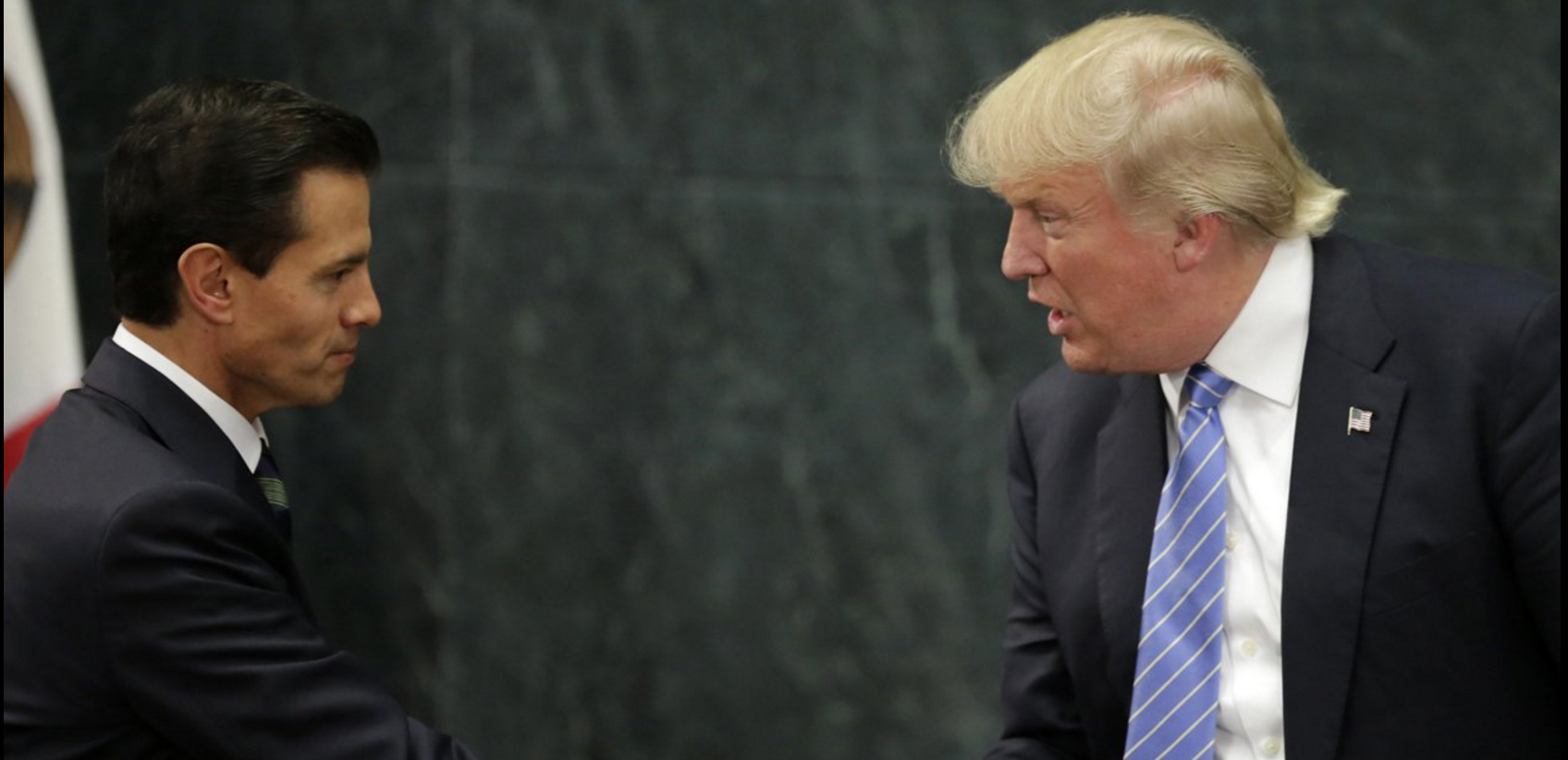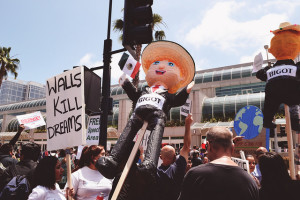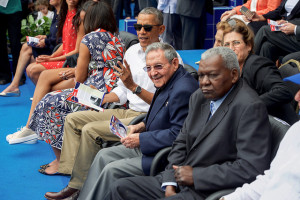The Big Question: Donald Trump and Latin America
 Donald Trump shakes hand with Mexican president Peña Nieto. http://bit.ly/2g423V2
Donald Trump shakes hand with Mexican president Peña Nieto. http://bit.ly/2g423V2
The world woke up to an alternate universe on November 9, 2016 as businessman and “Celebrity Apprentice” host Donald Trump was chosen to be the next leader of the free world. The world responded in disbelief as the United States validated its already negative international reputation by electing a ticking time bomb as president. Although Trump is perceived as a joke from abroad, his role as Commander-in-Chief could have severe impacts on the international arena. Donald Trump, described as a “neophyte in foreign policy and national security issues,” will hopefully obtain advisors well versed in world history and diplomacy to provide sound advice on pressing international issues. Trump has already expressed various bold statements and opinions on countries like China, Russia, and Syria, but his campaign focused primarily on Mexico and immigration concerns when discussing Latin America. Ultimately Donald Trump’s presidency raises imperative questions on what Latin America should expect in the future. How will Trump alter recent changes in the US-Cuban relationship that Obama repaired during his presidency? How will Trump’s aversion to free trade affect Latin American economies? Does Trump’s inward looking foreign policies appeal to Latin American leftists who have generally been against the US meddling in Latin American affairs?

Arguably one of the most controversial topics in Trump’s campaign was his stance on Mexico and illegal immigrants. His malignant rhetoric toward Mexicans as rapists and murderers along with his plan to build a great wall on the US-Mexican border created a negative strain on the US-Mexican relationship. Already the peso suffered its largest drop in 20 years, and the bank is widely expected to respond to the peso’s malaise by raising interest rates at least once more this year from 4.75% to as high as 6.75%. This tightening, which may be accompanied by cuts in public spending, could seriously impair a Mexican economy that is already struggling in the face of reduced industrial demand in America. Moreover, the xenophobic narrative Donald Trump has imprinted onto Americans has threatened the Latin American identity inside and outside the US. Many castigated Mexican president Enrique Peña Nieto for meeting with Donald Trump in August 2016. Nevertheless this meeting proved to be a smart diplomatic decision given Trump’s rise to power.
In order to protect the local American worker from losing jobs to workers abroad, Trump publicized his aims to remove the US from free trade agreements such as NAFTA. Some would argue this would be an unwise trading decision, especially since Mexico is currently America’s 3rd largest goods trading partner with $531 billion in total (two way) goods trade during 2015. The US and Mexico economies are inherently tied, and therefore removing the US from NAFTA might cost Mexicans millions of jobs. On the other hand, some argue that NAFTA didn’t benefit Mexico at all. In fact, enforcing neoliberal free trade policies and tying the Mexican economy to the US economy during some of the US’s worst recessions actually prevented the Mexican economy from growing and implementing necessary development policies. NAFTA also arguably undermined Mexico’s agricultural industries, as the agreement meant that some staple crops such as corn could now be imported from the U.S at a cheaper rate than could be offered domestically. Furthermore, Democratic candidate Bernie Sanders agreed with Donald Trump on this issue and argued free trade policies like NAFTA only represented US corporate interests and harmed the working middle class. It is questionable whether free trade agreements such as NAFTA are beneficial for Mexico, and other low-income countries, yet Donald Trump and Bernie Sanders were both firm on their perspectives toward free trade, while Clinton’s was uncertain.
Donald Trump’s stance in continuing President Obama’s new plan, Peace Colombia, is still unclear. Obama transformed a 16-year-old U.S. aid package known as Plan Colombia, to stop drug trafficking and military insurgency, into a new deal that increases U.S. aid to Colombia to at least $450 million next year, a boost of more than $100 million designed to help the government in Bogotá spread and solidify its rule once it reaches a peace deal with the Marxist-inspired FARC rebels. This extensive plan counters Trump’s isolationism, especially if the Colombian peace process fosters no immediate security threat to the US. Moreover, Alvaro Uribe, former Colombian president and enemy of the Colombian peace agreements, welcomed the Trump presidency, most likely hoping he will stop US support for the peace process. Oddly, the new Trump International Hotel & Tower built in Bogotá reveals the irony between Trump’s talk of isolationism and nationalism, while his own company relies on immigrant workers and international financing. Trump’s message for protecting American workers first doesn’t particularly align with his international business ventures in Colombia and elsewhere.
Lastly, the Obama Administration’s strides in mending US-Cuban relations could potentially be at risk with Trump in the oval office. Obama’s new #Cubapolicy re-established diplomatic relations, allowed US citizens to travel to Cuba, and opened US-Cuban trade relations. Obama’s “hand of friendship” toward Cuba is not only economically vital for Cuba, but also historically significant as it officially concludes another unnecessary Cold War legacy. Trump as president has the authority to reverse Obama’s new policies toward Cuba, a very likely prospect since he writes in his 100 day action plan to “cancel every unconstitutional executive action, memorandum and order issued by President Obama.” When asked to comment on Cuba, Trump criticized the deal by saying it was a “very weak agreement”, but somehow said that the deal was fine. If Trump were to reverse Obama’s Cuba policy, it would be a very complicated process. Since the normalization process began, many business and pharmaceutical ventures have been taking place with rumors of Trump’s own business taking interest. It would be interesting to see whether his company’s business interests influence his political position toward Cuba. Yet in an attempt to appeal to first generation pro-embargo Cuban-Americans in the interest of Cuban votes, Trump became more critical of Obama’s deal with Cuba. This further demonstrates how Trump’s original position on issues alters quickly to leave nations feeling unsure of what to anticipate. As a response to Trump’s win, Cuba announced in the government-run newspaper the Granma that Cuba will embark on five days of nationwide military exercises to prepare its troops and population to counter a range of enemy action. The vagueness of Trump’s foreign policy toward Latin America can only be treated with steady preparation and an anxious expectation for the worst.

Although Trump is commonly accused of being an authoritarian leader, ironically he resembles many Latin American populists who appealed to the working class such as Juan Perón of Argentina and Lázaro Cárdenas of Mexico throughout history. Trump’s campaign to protect the middle working class and reduce elitism and corporatism in politics mirrors Latin American history in a very peculiar way. In a sense, Trump’s win is only a product of history, an unchanging tune of the middle class wishing to speak up against political and economic elitism. However, Latin American populism eventually turned into socialist populism known as the “Pink Tide” – contradictory to Trump’s capitalist market values. These socialist movements have opposed US imperialism and intervention in Latin American regions since US Dollar Diplomacy began. While leftist Ecuadorian President Rafael Correa argues that a Trump presidency will spark left wing movements in Latin America, similar to what occurred during the Bush administration, some political scientists argue that left winged politics in Latin America is on an evident decline as shown by Evo Morales’ loss in Bolivia, Brazilian president Dilma Rousseff’s impeachment, and Venezuela’s current crisis. This only confirms that Trump’s foreign policy objectives for Latin America are mostly vague and unpredictable. He may be isolationist to some degree, but is known to change his mind depending on the day. Time will only tell to really know where Trump will take this world… and it might be a bumpy road.
